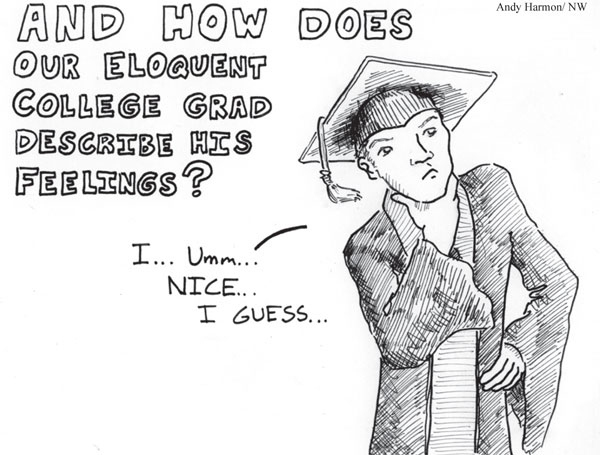We’ve all heard the speech from our parents and high school guidance counselors before: a college degree is essential to landing a job in this modern era. The days of getting a good job with only a high school diploma have been gone for a long time. But a new book, “Academically Adrift: Limited Learning on College Campuses,” argues that 36 percent of college students don’t improve in critical thinking, complex reasoning and writing, something that should concern not only universities across the nation, but also students attending those universities.
The authors of the book, professors Richard Arum of New York University and Josipa Roksa of the University of Virginia, conducted surveys of 2,300 students between the years 2005 and 2009. They tested for their skills in complex reasoning, critical thinking and writing. Their results found that 46 percent of students didn’t improve in the first two years and 36 percent didn’t improve in the whole four years.

While these students did go on to get college degrees and no doubt learned things that will help them in their potential profession, according to this survey they lack these very essential skills that will help them with real world problems. Barbara Schneider, a professor at Michigan State University, was quoted on Amazon.com as saying, “‘Academically Adrift’ raises serious questions about the quality of the academic and social experiences of college students.” Though the book does provide some solutions to the problem for universities to look at, the fact remains that this should be a concern for everyone in the university community. Complex reasoning, writing and critical thinking are skills that help everyone in the professional world on a daily basis. This book should be an awakening for everyone within education.
I think the problem is in how both students and professors often approach the information in a given class. As was stated in a column in the Feb. 24, intensive testing in a class often encourages cramming sessions the night before, a situation which doesn’t do the class, the professor or the student any favors. Cramming may result in a good grade, sure – but will you retain the information next week? Studying in a hurry the night before a test results in memorization, not learning.
“Academically Adrift” found that students majoring in liberal arts fields improve the most in crticial thinking, complex reasoning and writing skills more than students in other fields. Those majoring in business, economics, communications and social work saw the smallest gains. The authors believe this is because the liberal arts courses often have more in-depth writing and reading assignments, which allows a student to learn the material in-depth, rather than just filling out the dreaded one-of-four-bubbles in multiple choice.
James Rosenbaum of Northwestern University said in a review on amazon.com of “Academically Adrift” that “in this new era of college for all, their analysis refocuses our attention on higher education’s fundamental goals.” He’s absolutely right. It should focus students back on the reasons we’re in college.. We’re not here just to make friends and get a degree. We should be here not only to learn, but to learn how to learn effectively and thoroughly.
As a student, I definitely know the feeling of just wanting to skate by in a class, especially if it’s a class that has nothing to do with what I’m interested in. But if we’re not learning the most essential thing in college –– that is, learning how to learn, in crtiical thinking and complex reasoning and learning how to present what we’ve learned, in writing –– then the degree we’re getting isn’t all that valuable after all. Will students have the skills they need to live in the professional world after college? They might remember the economic and political climate that led to Japan attacking Pearl Harbor, they might remember James Baldwin’s short story “Sonny’s Blues” and they might even remember how the universe was formed at the onset of the Big Bang. But if they’re still thinking and reasoning at the level they were when they were seniors in high school after they walk across the stage to get their college degree, something terrible has happened in the education process.
Whether it’s the fault of universities or students, we all need to take personal responsibility and try and make sure this doesn’t happen. Do any of us really want a generation of people who still reason and write like they’re in high school running the nation in twenty years?





















